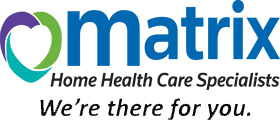Matrix Offers Online Observation List to Determine if an Older Adult Needs Care
Infrequent visits make changes in older adults noticeable. But are they cause for concern? Matrix Home Health Care Specialists offers an observation list that might be cause for concern.

Minneapolis, MN: A holiday visit often gives us the opportunity to catch up with an older adult we see infrequently. It’s because of the time span between visits that we notice changes which can give us concern.
The AAA tells us that more than 54 million people traveled during the extended Thanksgiving holiday. The Christmas and New Year holidays typically see only a percentage of this level of travel, but Reuters reports that a record number of Americans hit the roads, rails, and skies last year.
"We get a growing number of calls at the start of each year, after people have paid a holiday visit to an older adult,” says Karen Lawrence, RN, owner of Matrix Home Health Care Specialists. “Family members contact us because they’re concerned about the behavior or living situations they encountered during their visit. They’ve noticed something’s different.”
Lawrence explains that infrequent visits make these types of changes noticeable, and sometimes alarming. “Sometimes it’s not easy to determine if it’s part of the aging process, or there’s a reason to intervene,” Lawrence says. “We’ll get calls and hear a scenario, and we’re able to explain what might be occurring. More importantly, we can offer some actionable advice on what to do about it.”
What Lawrence and her staff have noticed is that these types of post-holiday calls tend to fall into three groups:
1. Physical Observations - Noticing that an older adult is unsteady on their feet, has lost or gained a significant amount of weight, or is not maintaining their appearance or their home.
2. Psychosocial Observations - Noticing that an older adult is depressed, confused, or forgetful, or that their relationships with friends or family members has deteriorated.
3. Support Systems - Noticing behavioral changes that might be attributed to the recent loss of a spouse, or isolation from friends, neighbors, or community.
“It can be difficult for people to take the first step in getting help for a loved one who’s an older adult,” Lawrence says. “Is what they observed during the holiday visit a true concern? It’s why we created what we call our Signs & Concerns observation list.”
Matrix Home Health Care Specialists encourages those visiting older adults during the holidays to go online and scan this free resource. If you’ve observed any of these behaviors or situations, it may be necessary to take the next step and intervene. “We want people to understand that there are signs that should give you concern,” says Lawrence. “It’s time to at least call a professional and discuss things. You might discover that there’s nothing to worry about. You’ll at least feel better knowing, and that’s the way a holiday trip to see loved ones should end, right?”
The Matrix Home Health Care Specialists Signs & Concerns observation list is not meant to be comprehensive, nor does it substitute for a diagnosis. The objective of this free resource is to help provide information to relatives and friends who may notice concerns after visiting an older adult.
About Matrix Home Health Care Specialists: We are a privately owned (not franchised) care management and home health care business. Matrix is run by a hands-on nationally certified gerontological nurse, who is also a Certified Case Manager. Matrix has been providing trusted quality care in Minnesota for over 30 years.

